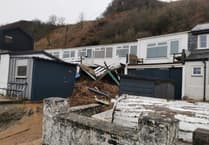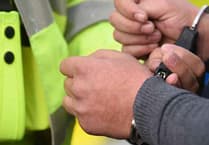Recent incidents off the Llŷn coast have led to an appeal for volunteers to help Porthdinllaen NCI.
The National Coastwatch Institution there were called to action just after 2pm on 29 August, when a kayak capsized half a mile to the west of Porthdinllaen NCI station on Nefyn Golf Course.
The Watchkeepers take up the story.
“We had just logged the position of two kayaks, who were towing an empty open canoe, when the incident occurred. One NCI watchkeeper showed himself on the station balcony, acknowledged a wave for help, and kept the kayaks in sight. Meanwhile the other NCI Watchkeeper phoned His Majesty’s Coastguard (HMCG) Holyhead to report the situation. She gave details of the incident’s position, the number of people (and craft) involved, plus other information requested by the very professional and calm coastguard. He contacted the RNLI Porthdinllaen lifeboat and the Porthdinllaen mobile coastguard.
“Unfortunately, the kayaks drifted out of our sight behind a promontory. However, at the request of the coastguard, we continued to scan the area near our last siting. And we were much relieved to see someone, whom we assume was a RNLI crew member who works on the golf course, rushing down to the RNLI station. Then other cars/vans arrived; so, a very short time later, the Tamar class lifeboat ‘John Spicer’ was launched. It proceeded to the location of the incident where they launched their two-man ‘inflatable’, probably because the kayaks had been close to the rocky promontory.
“During the incident we spoke to the coastguard a couple of times. He informed us that the rescue services were in contact with the kayakers; and, later, that a successful rescue had been affected. One person requiring the attention of the ambulance service.
“Phew! A more than usually busy day at the office we claim has the best view in the area. And what did we learn? Mainly, having two Watchkeepers present during an incident means we can give a better service in an emergency. At present we don’t have enough volunteers to achieve this, so, if anyone is interested in joining us at NCI Porthdinllaen please make contact. Our details are on our website (nci.org.uk/porthdinllaen) and Facebook page. We can’t promise that every watch will be as worthwhile as this one, but they do happen!
“The work of NCI watchkeepers is to provide eyes and ears along the coast, monitoring radio channels and providing a listening watch in poor visibility. When people get into trouble, we are there to alert HM Coastguard and direct the appropriate rescue services to the casualty.
“In 1994 when two fishermen lost their lives off the Cornish coast near a recently closed coastguard lookout, local people decided to open and restore the visual watch. When the first station was opened at Bass Point on the Lizard, NCI was born. Today 58 stations keep a visual watch around the coastline of England and Wales, with more in the pipeline.
“High technology and sophisticated systems such as radar and telecommunications have vastly improved safety at sea, but there is no substitute for a watchful pair of eyes. Accidents do happen and a computer or technology cannot spot a distress flare, an overturned boat, a yacht with problems, a water sports enthusiast in difficulty, children or adults in trouble, or possible pollution incidents. That is why our lookouts and watchkeepers are an important service provider to all those who use our coastal waters, footpaths and coastline.
“Each station is manned by a team of fully trained and dedicated volunteers who keep a daylight watch up to 365 days a year. Stations are equipped with telescopes, radar, telephone and weather instrumentation as well as up to date charts. Close contact with the Maritime Coastguard Agency (MCA) aims to promote stations to Declared Facility Status in order to become an integral part of the National Search and Rescue structure.
“Watchkeepers come from all walks of life and offer a wide range of skills and experience. Full training ensures that volunteers reach the high standard expected by the NCI and HM Coastguard. Regular assessments take place at all stations and refresher training programmes are run to maintain standards and keep watchkeepers up to date with the latest legislation or improved operational procedures.
“A log of all water-based activities is kept during each watch and, when requested, weather conditions can be passed to yachtsmen and fishermen before they put to sea. Also with the new generation of web cams we can identify sea conditions for those who wish to check on the weather or sea state prior to doing any watersport activity, hopefully reducing the need for HM Coastguard response and RNLI callouts. During each watch other activities such as canoeing and diving etc are closely observed, as are bathers, walkers and climbers who use our shoreline.
“Watchkeepers provide a vital link with all the emergency services and can provide an emergency contact point on land for both sea and shore users.”




